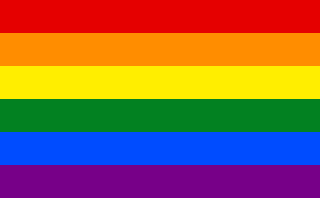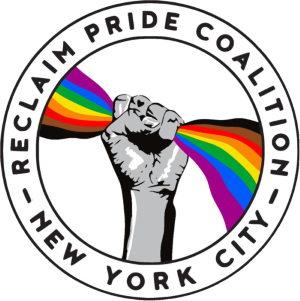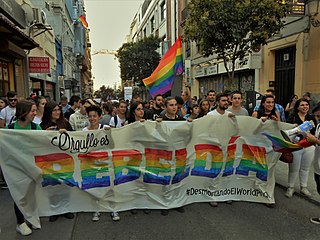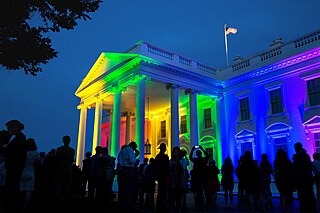
Queer is an umbrella term for people who are not heterosexual or are not cisgender. Originally meaning 'strange' or 'peculiar', queer came to be used pejoratively against those with same-sex desires or relationships in the late 19th century. Beginning in the late 1980s, queer activists, such as the members of Queer Nation, began to reclaim the word as a deliberately provocative and politically radical alternative to the more assimilationist branches of the LGBT community.

LGBT culture is a culture shared by lesbian, gay, bisexual, transgender, and queer individuals. It is sometimes referred to as queer culture, while the term gay culture may be used to mean either "LGBT culture" or homosexual culture specifically.

The NYC Pride March is an annual event celebrating the LGBTQ community in New York City. The largest pride parade in North America and among the largest pride events in the world, the NYC Pride March attracts tens of thousands of participants and millions of sidewalk spectators each June. The parade route through Lower Manhattan traverses south on Fifth Avenue, through Greenwich Village, passing the Stonewall National Monument, site of the June 1969 riots that launched the modern movement for LGBTQ+ rights.

The rainbow flag or pride flag is a symbol of LGBT pride and LGBT social movements. The colors reflect the diversity of the LGBT community and the spectrum of human sexuality and gender. Using a rainbow flag as a symbol of LGBT pride began in San Francisco, California, but eventually became common at LGBT rights events worldwide.

LGBT pride is the promotion of the self-affirmation, dignity, equality, and increased visibility of lesbian, gay, bisexual, and transgender (LGBT) people as a social group. Pride, as opposed to shame and social stigma, is the predominant outlook that bolsters most LGBT rights movements. Pride has lent its name to LGBT-themed organizations, institutes, foundations, book titles, periodicals, a cable TV channel, and the Pride Library.
The Center for Black Equity is a coalition of Black gay pride organizers formed to promote a multinational network of LGBT/SGL Prides and community-based organizations.
Atlanta Black Pride started in 1996 and is one of two officially recognized festivals for the African-American LGBT community. It is held in Atlanta each year at the end of August and beginning of September. Atlanta Black Pride is the largest black gay pride celebration in the world with an estimated 100,000 people annually in attendance. Atlanta Black Pride heavily contributes to the annual $65 million economic impact on Atlanta's economy during the city's eventful Labor Day weekend most recently organized by Traxx Girls Inc & Atlanta Black Pride Weekend LLC due to the administration dissolve of In The Life Atlanta.
Queer Azaadi Mumbai Pride March, also called Queer Azaadi March and Mumbai pride march, is an annual LGBTQIA pride parade that is held in the city of Mumbai, capital of Maharashtra, India. It usually begins from Gowalia Tank ending at Girgaum Chowpatty. It, along with the Pride Week, is organized by Queer Azaadi Mumbai, a collective of organizations and individuals working for the rights of LGBTQIA community. The participants of the march include people from the LGBTQIH community as well their "straight allies", from India and outside. In addition to being a celebration of queer pride, the pride march and related events are a platform to ask for equal rights.

New York City has been described as the gay capital of the world and the central node of the LGBTQ+ sociopolitical ecosystem, and is home to one of the world's largest LGBTQ populations and the most prominent. Brian Silverman, the author of Frommer's New York City from $90 a Day, wrote the city has "one of the world's largest, loudest, and most powerful LGBT communities", and "Gay and lesbian culture is as much a part of New York's basic identity as yellow cabs, high-rise buildings, and Broadway theatre". LGBT travel guide Queer in the World states, "The fabulosity of Gay New York is unrivaled on Earth, and queer culture seeps into every corner of its five boroughs". LGBT advocate and entertainer Madonna stated metaphorically, "Anyways, not only is New York City the best place in the world because of the queer people here. Let me tell you something, if you can make it here, then you must be queer."
Throughout Dallas–Fort Worth, there is a large lesbian, gay, bisexual, and transgender community. Since 2005, DFW has constituted one of the largest LGBT communities in Texas.
D.C.Black Pride is the first official black gay pride event in the United States and one of two officially recognized festivals for the African-American LGBT community. It is a program of the Center for Black Equity (CBE) and is also affiliated with the Capital Pride Alliance. DC Black Pride is held annually on Memorial Day weekend.

Rainbow capitalism is the involvement of capitalism, corporatism, and consumerism in appropriating and profiting from the LGBT movement. It developed in the 20th and 21st centuries as the LGBT community became more accepted in society and developed sufficient purchasing power, known as pink money. Early rainbow capitalism was limited to gay bars and gay bathhouses, though it expanded to most industries by the early-21st century.
Austin, Texas has one of the most prominent and active LGBT populations in the United States. Austin was acclaimed by The Advocate in 2012 as part of its Gayest Cities in America, and was recognized by Travel and Leisure as one of America's Best Cities for Gay Travel. Much of Austin's gay nightlife scene is clustered around 4th Street. LGBT activism groups Atticus Circle and Equality Texas are headquartered in Austin.

LGBT culture in Baltimore, Maryland is an important part of the culture of Baltimore, as well as being a focal point for the wider LGBT community in the Baltimore metropolitan area. Mount Vernon, known as Baltimore's gay village, is the central hub of the city's lesbian, gay, bisexual, and transgender communities.

Reclaim Pride Coalition is a coalition of LGBT groups and individuals that initially gathered in New York City in 2019 to create the Queer Liberation March in honor of the 50th Anniversary of the Stonewall riots and to protest the commercialization of LGBT Pride events. The following year, in solidarity with Black Lives Matter, the coalition organized the Queer Liberation March for Black Lives & Against Police Brutality.

Critical pride is the name of several annual protest demonstrations of LGBT people held in Madrid and several other Spanish cities. The organizers of critical pride demonstrations present them as an alternative to the original pride parades and festivals, which they consider depoliticized and institutionalized.

In Washington, D.C., LGBT culture is heavily influenced by the U.S. federal government and the many nonprofit organizations headquartered in the city.
Southern Fried Queer Pride (SFQP) is an Atlanta-based non-profit which works to center and empower Black queer and QTPOC communities in the South through the arts. Taylor Alxndr and Micky B co-founded the organization in 2014 to create a space for Black and brown queer folks in Atlanta. SFQP hosts 40-60 events each year, including festivals, drag shows, and community discussions. The organization also publishes its own zine, Kudzu, and organizes art projects like the SFQP Bites video series. A collective of Black and brown trans and non-binary working-class young folks and artists.










